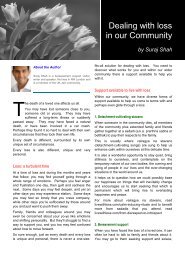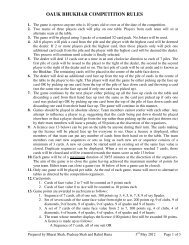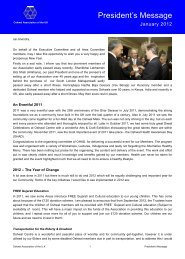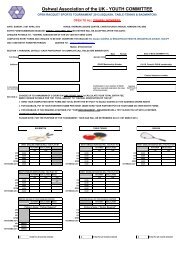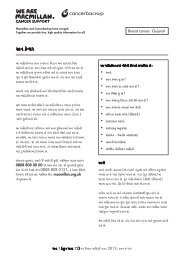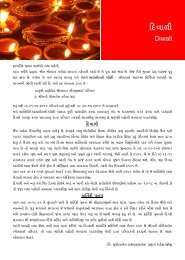June 2013 - Oshwal Centre
June 2013 - Oshwal Centre
June 2013 - Oshwal Centre
You also want an ePaper? Increase the reach of your titles
YUMPU automatically turns print PDFs into web optimized ePapers that Google loves.
Samayik is one of the most important ritual practices of Jainism during which we<br />
try to come closer to our soul. During samayik, we sit down in one place for fortyeight<br />
minutes isolating ourselves from our daily household, social, business, or<br />
school activities. In this time, we read religious books, pray, worship, recite navkar<br />
mantra using mara (string of beads), or do meditation. Before starting samayik,<br />
we remove our regular clothes and wear simple, but clean white cotton clothes<br />
which are reserved for samayik. We do not wear silk clothes or any leather<br />
articles which involve much violence to bugs or animals. White is the symbol of<br />
purity and calmness and that reminds us that we should stay pure and calm.<br />
Some of the items we need during samayik are an asan, muhapati, rajoharan,<br />
ghadi, anupurvi, mara and religious books that will help us to carry out some<br />
religious activities. After cleaning the ground with rajoharan, the asan is spread to<br />
sit. A muhapati is used to cover the mouth. Some people tie it to cover their<br />
mouth, while others hold it in their hand and use it to cover their mouth while<br />
speaking. A muhapati prevents small organisms from entering the mouth. It also<br />
becomes a buffer so that force of our voice and the hot air from our mouths would<br />
not kill many air beings. A muhapati also prevents spit falling on books. It also<br />
serves as a reminder to us that we should control what we say to others. A<br />
rajoharan is a kind of broom made of fine cotton or woolen threads used to clean<br />
the floor, and also to keep away the bugs coming towards us, so that they do not<br />
get hurt. If, for some reason someone has to walk during the samayik then the<br />
rajoharan is used to wipe the floor so that no bugs are crushed. A ghadi is a type<br />
of hourglass which helps us to know the time has reached 48 minutes. During the<br />
samayik some people read religious books, while others may recite Navkar<br />
mantra with mara or with the help of anupurvi or some may do meditation.<br />
During samayik, we should not talk or think of anything that involves any level of<br />
violence. Therefore, before starting the samayik we should stop our business<br />
activities, family affairs, and other matters, so that we do not get disturbed. We<br />
should inform our friends and family members to leave us alone from these<br />
matters during this time. During the samayik we should not discuss, read or talk<br />
about sensual things, or things related to worldly matters. During the samayik, our<br />
movements also should be limited so that we can observe ahimsa (non-violence)<br />
more easily. We should select a quiet, isolated place so that we are not disturbed<br />
by events going on around us. Because of such a detached atmosphere, and<br />
since we do not get involved in any worldly things for 48 minutes of samayik, we<br />
are like sadhus who live a detached life all throughout their life. Thus, this practice<br />
gives us some glimpse of monkhood and leads us in that direction.<br />
Just as we have to be careful about how we drive to avoid an accident, or get a<br />
speeding ticket, in the same way we have to be careful that we do not run into any<br />
trouble while performing our samayik. If we are not careful we can violate samayik<br />
by our mental, verbal and physical activities.<br />
Though it may look difficult, it is not impossible to do samayik the right way.<br />
This way samayik helps us in preventing the accumulation of new karmas and the<br />
penance we do during samayik helps us to remove some of our accumulated<br />
karmas.<br />
Article by, Varsha Dilip Harania<br />
There are ten MENTAL<br />
violations:<br />
1) to be disrespectful<br />
2) to be greedy for fame<br />
3) to be greedy for gains<br />
4) to be proud<br />
5) to be in fear<br />
6) to expect the rewards<br />
7) to doubt the rewards<br />
8) to be in anger<br />
9) to be rude<br />
10) to despise.<br />
There are ten VERBAL<br />
violations:<br />
1) to use abusive words<br />
2) to use alarming words<br />
3) to say non-religious words<br />
4) to speak inadequately<br />
5) to use words to incite fights<br />
6) to gossip<br />
7) to make fun<br />
8) to pronounce improperly<br />
9) to use irrational words<br />
10) to use jargon.<br />
There are twelve PHYSICAL<br />
violations:<br />
1) to sit at an unsuitable place<br />
2) not to sit steady<br />
3) to walk every now and then<br />
4) doing homework<br />
5) to stretch the body<br />
6) to lean against a support<br />
7) being lazy<br />
8) cracking knuckles<br />
9) to clean body dirt<br />
10) to scratch body<br />
11) to make vulgar postures<br />
12) to sleep.<br />
<strong>Oshwal</strong> Youth Magazine of O.A.U.K. 13 <strong>June</strong> <strong>2013</strong> Edition





